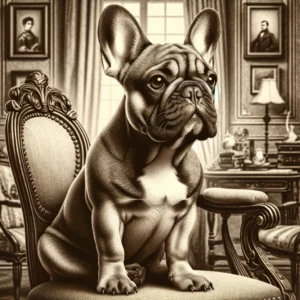
The French Bulldog, with its distinctive bat-like ears and charming personality, has become one of the most popular dog breeds worldwide. Known for their affectionate nature and playful demeanor, French Bulldogs make excellent companions for families, singles, and seniors alike.
This guide will provide you with everything you need to know about the French Bulldog breed, from their history and characteristics to health care and training tips. Whether you are considering adding a French Bulldog to your family or are already a proud owner, this comprehensive article will help you understand and care for these delightful dogs.
History and Origin of French Bulldogs

The French Bulldog, affectionately known as the “Frenchie,” traces its roots back to 19th century England. Initially bred as smaller versions of the English Bulldog, these “Toy Bulldogs” were popular among English lace workers. When the lace industry moved to France, these workers brought their small Bulldogs with them, where they quickly gained popularity, particularly in Paris.
In France, breeders refined these Toy Bulldogs, enhancing traits such as the distinct bat ears and compact size. The breed became known as the Bouledogue Français, or French Bulldog. By the late 19th century, the French Bulldog had established itself as a beloved companion in France and began to gain recognition in Europe and North America.
The breed’s popularity surged in the early 20th century. The French Bulldog Club of America was founded in 1898, and the breed was officially recognized by the American Kennel Club the same year. Since then, the French Bulldog has continued to captivate dog lovers with its affectionate nature and charming appearance.
Today, the French Bulldog is one of the most popular dog breeds worldwide. Its journey from English lace workers’ companions to a global favorite showcases its enduring appeal and unique qualities.
Breed Characteristics

French Bulldogs are known for their distinctive appearance and delightful personality. Here’s a closer look at what makes this breed unique:
Physical Appearance
French Bulldogs are small but muscular dogs with a sturdy bone structure. They typically weigh between 16 to 28 pounds and stand about 11 to 12 inches tall at the shoulder. One of their most recognizable features is their bat-like ears, which stand erect on their square-shaped heads. Their short, smooth coat comes in various colors, including brindle, fawn, white, and combinations of these. Their expressive eyes and compact, muscular build give them a charming and distinctive look.
Temperament
French Bulldogs are known for their friendly and affectionate nature. They are great companions and tend to form strong bonds with their families. Despite their sometimes stubborn streak, they are generally eager to please and respond well to positive reinforcement training. Frenchies are also known for their playful and lively demeanor, making them great companions for children and adults alike. They tend to get along well with other pets and enjoy being part of a household.
Health and Lifespan

French Bulldogs are generally healthy dogs, but they are prone to certain health issues that prospective owners should be aware of. Understanding these potential problems and taking preventative measures can help ensure your Frenchie leads a healthy and happy life.
Common Health Issues
One of the most significant health concerns for French Bulldogs is brachycephalic syndrome, a condition related to their short snouts that can cause breathing difficulties. This syndrome can lead to snoring, labored breathing, and in severe cases, heat intolerance. It’s important to avoid excessive exercise and exposure to high temperatures to mitigate these issues.
Other common health problems include hip dysplasia, which can cause pain and mobility issues, and allergies, which may lead to skin problems. Ear infections are also frequent due to their bat-like ear structure, which can trap moisture and dirt. Regular ear cleaning can help prevent infections.
Lifespan
The average lifespan of a French Bulldog is around 10 to 12 years. Providing a balanced diet, regular exercise, and routine veterinary care can help maximize their lifespan. Early detection and treatment of health issues can also significantly contribute to their overall well-being.
Preventative Care
Regular veterinary check-ups are crucial for maintaining your French Bulldog’s health. Vaccinations, dental care, and parasite prevention should be part of their routine healthcare regimen. A balanced diet tailored to their specific needs and weight management is also essential, as obesity can exacerbate many health issues.
Exercise is important but should be moderate. Daily walks and playtime can keep your Frenchie fit and mentally stimulated without putting undue stress on their respiratory system. Monitoring their activity and avoiding strenuous exercise, especially in hot weather, is key to preventing overheating and breathing problems.
By understanding the common health issues and providing proper care, you can help ensure your French Bulldog leads a long, healthy, and happy life.
Grooming and Maintenance

French Bulldogs are relatively low-maintenance dogs when it comes to grooming, but they do have specific needs that must be addressed to keep them healthy and looking their best. Here’s a comprehensive guide to grooming and maintaining your Frenchie:
Coat Care
French Bulldogs have a short, smooth coat that sheds moderately. Regular brushing, about once a week, can help remove loose hair and reduce shedding. A soft-bristle brush or grooming mitt works well for this purpose. Bathing should be done as needed, typically once a month or when they get particularly dirty, using a gentle dog shampoo to avoid skin irritation.
Nail Trimming
Regular nail trimming is essential for French Bulldogs. Overgrown nails can cause discomfort and lead to problems with walking. Aim to trim their nails every few weeks. If you’re not comfortable doing it yourself, a professional groomer or veterinarian can help.
Ear Cleaning
Due to their bat-like ear structure, French Bulldogs are prone to ear infections. Regular ear cleaning is crucial to prevent the buildup of wax and debris. Use a vet-recommended ear cleaning solution and gently clean the outer part of the ear with a cotton ball. Avoid inserting anything deep into the ear canal.
Wrinkle Care
French Bulldogs have adorable facial wrinkles that require special attention. These folds can trap moisture and bacteria, leading to infections. Clean the wrinkles regularly with a damp cloth and dry them thoroughly to prevent irritation and infection. Pay particular attention to the folds around the nose and under the eyes.
Dental Care
Dental hygiene is often overlooked but is vital for your French Bulldog’s overall health. Regular brushing of their teeth with dog-specific toothpaste helps prevent plaque buildup and dental diseases. Dental chews and toys can also aid in keeping their teeth clean and healthy.
Shedding Control
While French Bulldogs don’t shed excessively, seasonal shedding can occur. Regular grooming during these periods helps manage the extra hair. Providing a healthy diet rich in omega-3 fatty acids can also promote a healthy coat and reduce shedding.
Skin Care
French Bulldogs can be prone to skin allergies and conditions. Monitoring their skin for signs of irritation, redness, or dryness and consulting with your vet if issues arise is essential. Using hypoallergenic grooming products can help minimize the risk of skin problems.
With consistent grooming and maintenance, your French Bulldog will not only look great but also stay healthy and comfortable. Proper grooming is an excellent way to bond with your Frenchie and ensure they remain in top condition.
Training and Behavior

By following these training and behavior tips, you can ensure your French Bulldog grows into a well-mannered and happy companion.
Basic Training Tips
Training a French Bulldog can be a rewarding experience, but it requires patience and consistency. Start with basic commands such as “sit,” “stay,” and “come.” Use positive reinforcement techniques, such as treats and praise, to encourage good behavior. Short, fun training sessions are more effective than long, repetitive ones, as Frenchies can become bored easily.
Housebreaking
Housebreaking a French Bulldog should begin as soon as you bring them home. Establish a routine for bathroom breaks and take them to the same spot each time. Consistency is key. Praise and reward them immediately after they go outside. Accidents will happen, but avoid punishment, as it can create anxiety and hinder the training process.
Socialization
Proper socialization is crucial for French Bulldogs to develop into well-adjusted adults. Expose them to various people, environments, and other animals during their early months. This exposure helps prevent fearfulness and aggression. Puppy classes can also be beneficial for socialization and basic obedience training.
Dealing with Common Behavioral Issues
French Bulldogs can exhibit certain behavioral issues, such as separation anxiety and stubbornness. For separation anxiety, create a safe space for your Frenchie with toys and comfort items when you’re away. Gradually increase the time they spend alone to help them adjust. For stubbornness, consistent training and patience are essential. Positive reinforcement and maintaining a routine can help manage this trait.
Nutrition

By providing a balanced diet and following these nutritional guidelines, you can help ensure your French Bulldog stays healthy and energetic.
Dietary Requirements
French Bulldogs have specific dietary needs to maintain their health and energy levels. A balanced diet that includes high-quality protein, healthy fats, and essential vitamins and minerals is crucial. Look for dog food that lists meat as the first ingredient and avoid fillers like corn, wheat, and soy.
Best Types of Food
There are several types of food you can choose from for your French Bulldog:
- Dry Kibble: Convenient and good for dental health, dry kibble should be high in protein and free from artificial additives.
- Wet Food: More palatable and hydrating, wet food can be a good option, especially for picky eaters or those with dental issues.
- Homemade Diets: If you prefer to prepare your French Bulldog’s meals, ensure they are nutritionally balanced. Consult with a veterinarian or a pet nutritionist to create an appropriate meal plan.
Foods to Avoid
Certain foods can be harmful to French Bulldogs and should be avoided. These include chocolate, grapes, raisins, onions, garlic, and foods high in fat or salt. Always check with your veterinarian before introducing new foods to your Frenchie’s diet.
Feeding Schedule
Establishing a regular feeding schedule helps maintain your French Bulldog’s digestive health. Puppies typically require three to four meals a day, while adults can be fed two meals a day. Monitor their weight and adjust portion sizes as needed to prevent obesity.
Treats and Supplements
Treats can be a great training tool, but they should be given in moderation. Look for healthy, low-calorie treats that provide nutritional benefits. Additionally, supplements like omega-3 fatty acids can support coat health, while joint supplements can help prevent mobility issues.
Exercise and Activity Needs

By providing a balanced mix of daily exercise and engaging activities, you can help your French Bulldog maintain a healthy weight and stay mentally stimulated.
Daily Exercise Requirements
French Bulldogs require moderate exercise to stay healthy and happy. While they are not as energetic as some breeds, regular physical activity is essential to prevent obesity and keep their muscles toned. Aim for at least 30 minutes of exercise per day, divided into a couple of short walks or play sessions.
Types of Activities
French Bulldogs enjoy a variety of activities that cater to their playful and curious nature:
- Walking: Daily walks are great for exercise and mental stimulation. Keep walks at a moderate pace to avoid overexertion.
- Playtime: Engage your Frenchie in interactive play with toys such as balls, tug ropes, and puzzle toys. These activities provide both physical and mental exercise.
- Indoor Activities: On days when outdoor exercise is not possible, indoor activities like hide and seek, training sessions, or playing with interactive toys can keep your Frenchie active.
Indoor vs. Outdoor Activities
While outdoor activities are beneficial, French Bulldogs can also thrive with indoor exercise, especially in extreme weather conditions. Ensure that any outdoor exercise is done during cooler parts of the day to avoid overheating, as Frenchies are prone to heat exhaustion due to their short snouts.
Signs of Overexertion
It’s important to monitor your French Bulldog during exercise for signs of overexertion. Heavy panting, drooling, or difficulty breathing are indicators that your Frenchie needs a break. Always provide access to fresh water and avoid strenuous activities in hot weather.
Conclusion
In conclusion, French Bulldogs are a delightful and charming breed known for their affectionate nature and distinctive appearance. Understanding their history, characteristics, health needs, grooming requirements, and training tips is essential for any current or prospective owner. By providing proper care, nutrition, and a loving environment, you can ensure that your French Bulldog thrives and remains a happy, healthy companion for years to come. Whether you’re a new Frenchie owner or an experienced one, the insights and resources shared in this guide will help you make informed decisions and strengthen the bond with your beloved pet.
FAQs
What are common health issues in French Bulldogs?
French Bulldogs are prone to several health issues, including brachycephalic syndrome, hip dysplasia, allergies, and ear infections. Regular vet check-ups and preventative care are crucial for managing these conditions.
How much exercise does a French Bulldog need?
French Bulldogs require moderate exercise, about 30 minutes per day. This can include short walks and playtime. Avoid excessive exercise, especially in hot weather, to prevent overheating.
What is the best diet for a French Bulldog?
A balanced diet with high-quality protein, healthy fats, and essential vitamins and minerals is ideal. Options include dry kibble, wet food, and homemade diets, tailored to meet their specific nutritional needs.
How often should I groom my French Bulldog?
French Bulldogs need regular brushing, about once a week, and bathing as needed. Their ears, wrinkles, and teeth should be cleaned regularly to prevent infections and maintain overall health.
Are French Bulldogs good with children and other pets?
Yes, French Bulldogs are generally friendly and get along well with children and other pets. Proper socialization from an early age helps them develop good relationships with family members and other animals.




